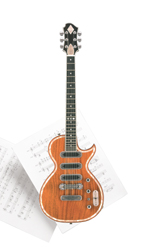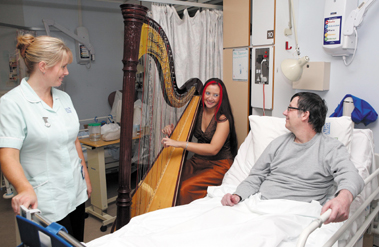

2008 Jincheon Healing Music Festival held from July 25 to 27 drew in a huge crowd, reflecting growing interest on therapeutic effects of music. Music is everywhere around us, in shops, streets, and it is usual to see someone beside you listening on the mp3 player. Background music in commercial advertisements is becoming more sophisticated and often title of the song is sought in search engines. Music has penetrated deeper into our lives than one might think. What is it about music that so fascinates us?
Music and How It Affects Us
The music constantly evolved with development of human civilization to express various themes and more complex feelings. Much as music can pronounce human feelings, it can also bring influence on physical and mental state. "Music with different beats can cause different emotions and can affect biorhythm, pulse and brainwave," said music therapist Ha Eun-kyung, of Ha Eun-kyung Pratice for Music Therapy. "Music with a strong beat can cause brainwaves to respond and resonate along with the beat, with faster beats bringing more alert concentration and more astute thinking, and a slower beat producing a calm, relaxed state." Dr. Edward Podolsky of Brooklyn, USA, claimed certain sound waves produce subtle chemical changes in glands, muscles, and nerves (The doctor prescribes music by Podolsky, 1939). It is an observed fact that shrill music played near an egg for about 30 seconds will coddle it. The body contains many chemical compounds similar to those found in eggs. With alterations in brainwaves come changes in other bodily functions. "Those governed by the autonomic nervous system, such as breathing and heart rate can also be altered by the changes which music can bring. This can mean slower breathing, slower heart rate, and an activation of the relaxation response, among other things," said therapist Ha. This is why music and music therapy can help counteract or prevent the damaging effects of chronic stress, greatly promoting not only relaxation, but also health.
"Music can also be used to bring a more positive state of mind, helping to keep depression and anxiety at bay. It is useful in treating depressions in the elderly and children with learning disorder," said Jung Hae-sook, a professor of Music Therapy at Hanzhong University. This can help prevent the stress response from wreaking havoc on the body, and can help keep creativity and optimism levels higher, bringing many other benefits. Music has also been found to bring many other benefits, such as lowering blood pressure, boost immunity, ease muscle tension, and more. Lowering the blood pressure can reduce the risk of stroke and other health problems over time. With so many benefits and such profound physical effects, it is no surprise that so many are seeing music as an important tool to help the body stay or become healthy.
Music, Doctor Without Knife
Everyone must have had an experience of wanting to shake the body to the beat of the music. Such ability of music to affect a person? mind is used in music therapy. Using music to heal both body and mind is known to have been applied as early as in the times of Plato and Aristotle. It began to be widely practiced to treat the injured in World War II to overcome the shadows of the war, both physical and mental.
Music, through both listening as well as playing it, affects blood pressure, pulse rate or number of heart beats per minute, respiration, skin response, brain wave, and muscle reaction. Korea Institute for Music Therapy terms this ability of music as music medicine and treatments based on the use of music medicine as music therapy. There is no definite standard prescription for sicknesses. "The therapist first builds trust with the patient and then finds the way best suited to treat the patient. After all, one cannot force a patient to listen to a typical genre of music when he has no tastes for it," said professor Jung. Examples of modes of treatment can include singing, listening, playing instruments, composition, moving to music, and music and imagery exercises. "Music is a mediator," said professor Jung. In case of physical illness, it can only be used as assistance. For example, for a patient who suffered a stroke and got certain muscles paralyzed, the rhythmical beat of the music can stimulate the sensory nerves and be used to treat recover motor senses or use of muscles. But before that, the patient would need a medical treatment. Music may not be a 100 percent remedy, but it can bring solace to the soul that medical treatments may fail to reach out to. "Music therapy was first formally introduced in Korea with establishment of graduate course in music therapy at Sookmyung Women's University in 1997. It has since become widely spread, especially in social welfare. It is also adopted at hospitals, but not as much," said professor Jung, of the present condition of music therapy in Korea.

Found yourself humming a tune? No surprise. The music is so much a part of life it would be hard to find someone who cannot name a list of favorite songs. One magical spell of music most easily noticed is background music in movies, dramas and commercials. Background music adds to the dramatic effects and smears the audience into the scene. It gives stimulus to auditory senses in addition to the visual senses presented by the movie and thus enables stronger appease to our senses and spurs emotional illusion.
Music is also used as a part of a marketing strategy. In restaurants, it has profound effect on how the customers act. Experiment conducted on medium sized restaurants in Fort Worth and Dallas, USA showed that background music affected diners to spend more time to eat. Slow music influenced them to take an average of 12 minutes more. Fast beat makes people feel time is flowing faster and eat in a shorter time (The influence of background music on the behavior of restaurant patrons by Ronald E. Milliman, 1986). Similar applies to supermarkets too. When, over the period of nine weeks, no music or slow or fast tempo music was played to the shoppers, they were observed to purchase 33 percent more goods with slow music without being aware (Using background music to affect the behavior of supermarket shoppers by Milliman, 1986). So beware next time you go shopping. Do not let the music entice you! And another thing that has caught attention was various CDs with music said to help improve concentration. "Simply listening to those CDs will not be of much help. People have their own personal tastes in music, and rather, it would be a better idea to listen to one's own list of songs," said therapist Ha.
A Multi-Talented Joy
The music does not only provide us with pure joy of enjoying it, but can also assist in reaching mental and physical stability and wellness. It can bring about most amazing results in such gentle way by affecting our brain, without use of any chemicals. And it does not have to be some heavy problems that are for music healing either. Just easing the mental stress by listening to music at the end of the day is a pleasant way to prevent too much stress damaging the health. Music is also hired as regular employee to lure customers and made it a fact that good choice of background music in commercials, movies, theatre productions, etc, is worth as much as hiring a popular celebrity. Putting all those talents of music aside, music can still shine for simply what it is. It is what makes us hum, tap our toes, sway to the beat and snap our fingers with so much ease. So get immersed and simply enjoy all that it presents us. Are you ready to say "Bravo!"?

